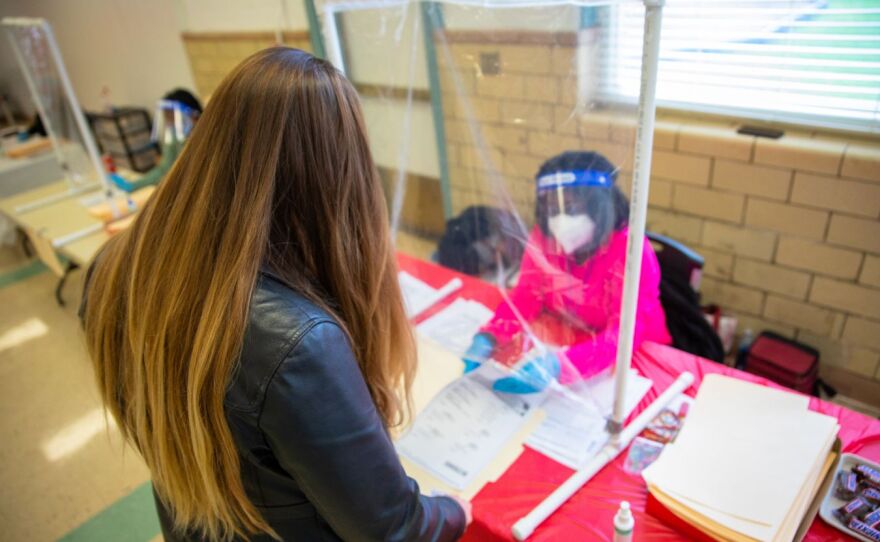*VPM News Interns Connor Scribner and Lyndon German reported this story.
In Virginia, Democrats will determine their party’s gubernatorial nominee via a primary, while state Republicans organized a convention.
Republican Convention
After months of back and forth, the Republican party’s top committee opted to host an unassembled convention at up to 37 satellite locations, according to the party’s spokesperson. Voters will determine their party's nominee for Virginia’s statewide offices via ranked-choice vote.
Only delegates are allowed to vote at a convention. Any eligible voter in Virginia who adheres to the Republican party can become a delegate. Delegates are chosen by their district’s local Republican committee and the number of delegates are determined by the number of GOP votes cast in the previous national election.
Although the total number of delegate votes assigned to each local unit are predetermined, there’s no limit to the number of delegates in each unit. That means all votes are not equally weighted, with voters in red-leaning localities likely to have greater heft than denser, bluer parts of the state. To become a delegate, one must complete the following registration form and be certified by their local party chair.
Deadlines to apply are set by local party committees and vary across the state; the vast majority have already passed. The Virginia Republican Convention will be held May 8, 2021 from 9 a.m. to 4 p.m.
Unlike past conventions, the event won’t be held at a single site, and voters won’t have to stick around all day through successive rounds of speeches and voting. Instead, they’ll drop off a single, ranked-choice ballot before heading back home.
Ranked choice voting allows voters to select candidates in order of the voter’s preference. The candidate who wins a majority of first-choice votes is declared the winner. If no candidate secures a majority of first-choice votes, the candidate with the fewest first-choice votes is eliminated and those votes will be distributed to voters’ second-choice candidates. That process repeats until one candidate has a majority of votes.
Primary Election
Virginia Democrats are set to decide candidates for the commonwealth’s three statewide offices on June 8, 2021, though many are expected to cast their ballots before that day.
Those looking to vote in the upcoming primary, which will determine the party’s candidates for governor, lieutenant governor and attorney general, must register to vote by May 17. Those already registered have until that day to update their information, but they do not have to indicate party affiliation to vote in the primary.
Voters have multiple options to cast their ballots following a suite of reforms passed by the General Assembly in 2020. Virginians can already apply to vote absentee in the primary, with no excuse needed, and have the option to apply to vote absentee in all 2021 elections. For the primary election, voters are not required to have a witness sign their absentee ballot. Mail-in absentee ballots must be requested by May 28 at 5 p.m.
Additionally, some temporary changes to make absentee voting easier during the pandemic were made permanent by the General Assembly this year. Lawmakers included measures in the budget to remove the witness signature requirement and provide prepaid postage on mail-in ballots during the primary. They also passed legislation that will carry those measures forward indefinitely.
Early, in-person voting starts on Friday, April 23. Polling places will vary, but most will be in each local registrar’s office or at a satellite voting location during regular business hours. People will also be able to vote in-person on the two Saturdays prior to the day of the June 8 primary. Early voting will end at 5 p.m. on June 5.
People voting in person, whether doing so early or on the day of the primary, will have to provide an approved form of identification or sign an ID confirmation statement. Voters who do not bring an approved ID, and don’t wish to sign a confirmation statement, may cast a provisional ballot which will be counted after the required ID is shown to the registrar’s office before noon on Friday, June 11.
Voters are expected to follow COVID-19 safety guidelines recommended by the CDC and the Governor's office. Poll workers will be equipped with personal protective equipment and will adhere to social distancing guidelines. Voters are expected to wear masks when they go to the polls.
New Voting Laws in the November 2021 General Election
While the General Assembly did pass some voting reforms earlier this year, those changes won’t take effect until July 1, in time for November’s general election.
Among the new laws are the following:
- Voter’s can be added to a “permanent absentee voter list” to receive absentee ballots for all future elections;
- Localities will be required to establish absentee ballot drop-off boxes;
- Some localities will begin to offer early, in-person voting on Sundays;
- All voters with physical disabilities or injuries will be able to vote curbside. During a public health emergency, all voters can request to vote curbside;
- Firearms will be banned within 40 feet of a polling place.
On Election Day, poll workers will begin counting absentee ballots in the morning, but results will not be reported until after polls close. As with every election, results are not confirmed the night of an election. Results are final when the election is certified by the State Board of Elections two weeks later.
If you don’t know where to vote you can visit the Virginia Department of Elections’ website to check your polling place and registration status.










